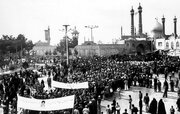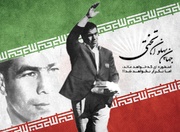Mohammad Ali Jamalzadeh was born in 1892 in Isfahan. His worldview was shaped early on by his father who was a prominent and also a cleric and preacher, with his passionate and effective orations that attracted a large following and was instrumental in popularizing constitutionalist ideas such as freedom, justice and the rule of law for the ordinary people and the poor (Taghizadeh, in Jamalzadeh, 1999, pp. 14-15).
In addition to receiving education by accompanying his father to his meetings, sermons and speeches, Jamalzadeh was also educated in Lebanon (a few months before the anti-constitutionalist coup), received his law degree at the University of Dijon in France, and returned to Iran in 1915 before moving back to Europe and eventually settling in Berlin. There, he became a member of Iranian nationalists against the British and Russian interference in Iran.
‘Once Upon a Time’ was his first and most important collection of short stories published in 1922 which contains the successful story ‘Farsi shekar ast’ (Persian Is Sugar), which laid the foundation for modern Persian prose. This collection was actually the first collection ever of short stories which featured a manifesto for modernist Persian prose writing, and the six anecdotal stories treat “events of the 1910s in Iran with realism, local color and satirical humor.” All these stories, in addition of being pioneers, have a simple, fluid and easily understandable prose which was in line with fulfilling literary democracy as mentioned in the manifesto.
‘Persian is (as Sweet as) Sugar’ treats the failure among a group of Iranians to communicate successfully among themselves, owing to their different origins, educational backgrounds, and class affiliations.
In the story, when the narrator, an apparently middle-aged, worldwise Iranian just back from Europe, is detained in a customs-house cell, he is met with a number of other ‘guests’ whom he starts to describe in detailed, everyday language.
“I first caught sight of one of those phony Europeanized types…our ‘Europeanized’ gentleman had a high collar as high as a samovar pipe…immersed in reading a novel in the dim light.”
‘Mr. Europe’ as he calls him, sat in his little niche during all the commotion the other present in the cell were making, then occasionally he would ‘take his watch out and glance at it as if he wanted to know if it were tea time or coffee time.”
Another detainee, ‘Helpless Ramazan’ after having failed to establish a communication with a cleric as to find out why they have been detained, approaches Mr. Europe , “like a hungry child going to his stepmother for a piece of bread.”
But Mr. Europe does not prove to be of much help either. “Revolution without evolution is inconviceable! We young people must assume the responsibility of guiding the public. As for my part, I have written a lengthy article on this sujet in which I have proved with a blinding force that nobody should abdicate his reponsabilite to others…”
Needless to say, the meek, helpless Ramzan was quite intimidated by the pompous and nonsensical speech, giving himself up completely for lost.
Ramazan then started pounding his fists on the cell door, “For the sake of God and the Prophet I am losing my mind. You’ve made me partner in a grave with an incredible trio. One, may he drop down dead, is a European, who stands brooding like an owl in a corner as if he were going to devour you with his evil eye. As for the other two, they do not understand a word of human speech; they are both jinns and I just don’t know who would have to answer to God if they took it into their heads and started to strangle poor me!”
When the narrator steps forward and talks to Ramazan, in genuine Persian which he understands, Ramazan is overwhelmed with such joy that he starts kissing the man’s hand repeatedly.
“I’ll do anything for someone who speaks as you do…God himself has sent you to rescue my soul!” he exclaimed.
At this point the four cellmates are released, and Ramazan comments that “on this particular day every imaginable lunatic is being sent to Enzeli.”
Jamalzadeh has played a highly remarkable role in Iran’s literary revival. While his works would occasionally come under attack by certain groups as insulting, they were also praised as a great innovation in Persian literature, thus creating a combination of fame and controversy for him.
He was also fluent in French, German and Arabic, which made him an able translator. His translations of Bernardin de Saint Pierre, Moliere, Ibsen, Schiller and Van Loon were published in various Persian periodicals throughout his working years.
After the Islamic Revolution of 1978, Jamalzadeh visited Iran briefly and then returned to Geneva where he spent the rest of his life until 1997.























Your Comment